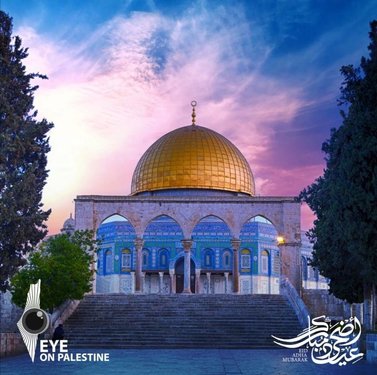-
Posts
8,466 -
Joined
-
Days Won
773
Content Type
Profiles
Forums
Events
Everything posted by ummtaalib
-
Israeli settlers launch mass outpost construction operationHundreds of Israeli settlers set out across the occupied West Bank on Wednesday to take part in an unprecedented effort to erect a number of illegal settlement outposts in the territory. Led by Daniella Weiss, a leader of the religious-Zionist and settler movements and an advocate of an “Arab-free” Jewish state, the plans started as a goal of establishing “10 Evyatars” - named after the Evyatar outpost in Beita, what the group considers to be one of its most successful settlement projects in years. Although technically illegal under Israeli law, the new campaign appears to have Far-right Israeli settlers have tacit government support, and is bringing a new wave of violence against Palestinian along with it. Read more here
-
-
19: Bring Your Heart To Salah: Love, Hope & Fear Think of the human being you love the most. Imagine a situation where you have not met for a year. Now is the time for you to finally reunite. How will you feel? What will be running through your mind? How fast will your heart be beating? Similarly, every ṣalāh is an occasion in which you reunite with Allah (ʿazza wa jall) after having been parted. You should feel the same trepidation and excitement at its arrival. As you journey towards Allah (ʿazza wa jall), in and outside of your ṣalāh, there are three primary emotions you should try to cultivate in your heart: hope, fear and love. Hope Hope in Allah (rajā’) is the first of these three emotions. Open your heart and allow it to become overwhelmed with the mercy and kindness of Allah (ʿazza wa jall). Rajā’ springs from thinking good of Him and attaching your heart to Him. In a ḥadīth qudsī, Allah stated, “I am as My slave thinks of Me” (Bukhārī). Remember that Allah (ʿazza wa jall) wants to forgive you. Allah does not want to ‘catch you out.’ Rather He ‘catches’ you when you fall, so long as you turn to Him. Allah (ʿazza wa jall) wants to forgive you, shower you with His mercy and guide you to Paradise. Believe this from the bottom of your heart. Belief in the heart is not enough however. Your belief must be accompanied by action. You must make a distinction between rajā’ and tamannī (wishful thinking). Tamannī is when you fail to take action, yet you still hope for a good outcome. Conversely, rajā’ is when you take the means and place your hope in Him. Such a hope, or rajā’, is achieved by acknowledging everything Allah has blessed you with. Always return to the Source of every blessing in your life: Allah (ʿazza wa jall), the Supreme Provider (al-Razzāq). Another powerful way to fill your heart with hope in Allah (ʿazza wa jall) is by reflecting on His Beautiful Names. The more you know Allah, the more hope you will have in Him. Allah is al-Muṣawwir (The Fashioner); He has created you in the most beautiful form. Allah is al-Raḥmān (The Extremely Merciful); His mercy encompasses all of His creation. Allah (ʿazza wa jall) is The Concealer of sins (al-Sittīr); He (ʿazza wa jall) will not expose you despite the multitude of your sins. Allah (ʿazza wa jall) is Gentle (al-Rafīq); He loves gentleness. Allah is The Most Compassionate (al-Ra’ūf); His compassion knows no ends. Allah (ʿazza wa jall) is The Most Modest (al Ḥayiyy); He feels shy to turn you back, empty-handed. What choice do you have other than to have hope in Him? Fear Fear is the second emotion which should overwhelm you in ṣalāh. Fearing Allah (ʿazza wa jall) should make you tremble in awe of Him and humble you in front of Him. Some say that we should mainly focus on loving Allah (ʿazza wa jall) and having hope in Him. They argue that positivity will bring people closer to the dīn. However, this is misleading and can damage our understanding and application of the dīn. Allah (ʿazza wa jall) says, “…They used to race towards the good deeds and invoke Us with hope and fear; and they were humbly submissive to Us” (21:90). In a ḥadīth qudsī, Allah (ʿazza wa jall) says, “By My Glory, I will not combine two fears nor two assurances for My slave: if he feared Me in the world, I will grant him safety on the Day of Judgement. And if he felt safe from Me in the world, I will make him fear Me on the Day of Judgement.” (Ibn Ḥibbān) In life, you tend to run away from what you fear. For example, anyone who is scared of spiders or rodents will freeze or run away upon seeing them. However, fearing Allah (ʿazza wa jall) is unique and beautiful. It makes you flee to Him, and not away from Him. The more you fear Him, the more you turn to Him. A fear of worldly matters is usually accompanied by a dislike of it. However, the fear of Allah is coupled with love and respect. You are in awe of Him. Although Allah (ʿazza wa jall) is beyond all worldly examples, think of an elderly grandfather or an older person who is well-respected. As soon as he enters the room, everyone falls quiet out of respect for him. The silence is not because this elder is a tyrant of the household; rather, it is because of the respect that his family accords him. This type of fear is known as haybah or khashyah, a reverential type of fear. It is this emotion that the senior Companion ʿAmr b. al-ʿĀṣ (raḍiy Allāhu ʿanhu) felt when he was in the presence of the Messenger of Allah ﷺ . He said even though he ﷺ was the most beloved of people to him, he could not describe him. This is because whenever he was in his company, he was unable to look directly at his blessed face. He would lower his head and humbly gaze downwards, out of deep respect and awe. The fear of Allah (ʿazza wa jall) is not an irrational fear. It is a fear built on knowledge. The more you get to know Him, the more you fear Him. You are in constant awe of His majesty, greatness and power. When the Prophet ﷺ saw Jibrīl (ʿalayhis-salām) in his original form, he had 600 wings, and his huge size filled the horizon between the sky and the earth. Jibrīl is the best of angels, who was tasked with the most prestigious responsibility of transmitting the word of Allah. Despite his physical and spiritual greatness, the Prophet ﷺ saw him on the night of Miʿrāj (ascension) looking like “a worn-out piece of cloth due to the fear of Allah” (Ṭabarānī). Jibrīl’s knowledge of Allah’s majesty and greatness reduced him to this state. Aim to strike a balance between excessive fear and a lack of fear. If there’s too much fear, you’ll end up in despair. And if there’s too little, you’ll become complacent and feel secure from Allah’s punishment. Fear is a deterrent. It prevents you from becoming distracted, disobeying Allah and falling off the right path. Three steps to cultivate fear in your heart 1) Reflect on Allah’s greatness, grandeur and majesty. 2) Reflect on the gravity of standing before Allah (ʿazza wa jall), the terrors of the grave, the horrors of the Day of Judgement, the sharpness of the ṣirāṭ and the torment of the Hell-fire. 3) Think about your sins and shortcomings. Reflect on how little you have prepared for your journey to the hereafter. A life between hope and fear The pious people of the past would advise that during good times, when you are more likely to forget Allah (ʿazza wa jall), you should increase your fear of Him. And during difficult times, you should increase your hope in Him. Other scholars stated that throughout one’s life, fear should be dominant over hope; but towards the end of one’s life, hope should become dominant. When Muʿādh b. Jabal (raḍiy Allāhu ʿanhu) was in his final moments, he turned to Allah (ʿazza wa jall) and said, “O Allah, indeed I used to fear you, but now I have hope in You. O Allah, indeed, you know that I did not love the world nor want to remain in it for long to dig wells or plant trees. Rather it was to experience thirst in the midday heat during the long fasts; to struggle through standing for hours at night in prayer; and to kneel in the company of scholars in the gatherings of dhikr.” Anas (raḍiy Allāhu ʿanhu) reported that the Prophet ﷺ entered upon a young boy who was dying. The Prophet ﷺ asked him, “How are you?” The boy replied, “O Messenger of Allah, I swear by Allah that I have hope in Allah and I am scared over my sins.” The Messenger of Allah ﷺ said, “These two (qualities) do not gather in a slave’s heart in such a moment except that Allah gives him what he hopes for, and protects him from what he is scared of.” (Tirmidhī) Love Love is the third – and most important – emotion. Love is the greatest station the seeker on the path to Allah (ʿazza wa jall) can attain. The love of Allah (ʿazza wa jall) is the purest and greatest of all loves. It gives life to the heart, it is sustenance for the soul, and is the roadway to eternal success. When your heart overflows with His love, you will experience genuine bliss and contentment. Ibn Taymiyyah (raḥimahullāh) said, “Know that there are three things that push the hearts towards Allah: love, fear, and hope. The strongest of these three is love; and it is something that is sought-after in and of itself, since it is something that is desired both in this world and the hereafter, as opposed to fear, which will disappear in the Hereafter. Allah says, ‘For certain, the friends of Allah shall have no fear, nor shall they grieve’ (10:62).” Our purpose in life is to worship (ʿibādah) Allah. ʿIbādah consists of: (1) utmost humility and (2) utmost love. Without love, there is no ʿibādah. Without love, we fail in actualising our purpose of existence. Love is the ‘soul’ of worship. Loving Allah (ʿazza wa jall) is beautiful. It cannot be compared to loving any of His creation, as His creation will cease to be, whilst He is the Ever-Lasting. His creation has limits, whilst He is the Limitless, the All-Encompassing and the Most Able. Loving Allah (ʿazza wa jall) is beautiful because there is no one kinder, more giving and more appreciative than Him. As humans, we are prone to making mistakes, and we are prone to not forgiving those who have erred. On the other hand, Allah (ʿazza wa jall) loves to forgive and will forgive us even if we go to Him with mountains of sins. Our fellow humans tire of our persistent questioning and begging. However, Allah (ʿazza wa jall), our Generous Lord, does not stop giving and is angered when we don’t ask from Him! Loving Allah (ʿazza wa jall) can only be achieved when you prefer Him over everything else. You must love Him more than you love your parents, children, spouse, friends and wealth. Love – by the consensus of the scholars – is an obligation (farḍ) and one of the fundamental aspects of the dīn. When considering matters that are farḍ in our dīn, loving Allah (ʿazza wa jall) does often not cross our minds. Moreover, when we reflect on loving Allah (ʿazza wa jall) , we tend to equate love to obedience. We often limit our perception of Allah (ʿazza wa jall) as someone Very Powerful and Scary. Yes, Allah (ʿazza wa jall) is Extremely Powerful, and this should make us tremble, yet equally, there is nothing more soothing and comforting to the soul than His love. There is a vast difference between someone who obeys Allah (ʿazza wa jall) out of love for Him, and someone who obeys Him without love. When a lover obeys his beloved, the obedience is done willingly and sincerely. Such a level of obedience differs from that brought on by force. The former experiences happiness and joy in willingly complying to the orders, whereas the latter feels burdened, and may even resent the order. Love, therefore, is the driving force and the impetus of ʿibādah. It is this love of Allah (ʿazza wa jall) that makes the slave-Creator relationship special. This love makes the servant eager to be in His company, to converse with Him and do everything possible to please Him. Obedience with love is not just a tick-box exercise that solely involves the fulfilment of obligations. Instead, it consists of a sincere desire to be with Him and remember Him. Love makes the slave eager to meet Him. Love is what makes him cry out in the depths of the night, “My Lord, do not deprive me of the greatest joy: the joy of seeing You in the Final Abode.” The next time you stand up for your ṣalāh, fill your heart with the aforementioned emotions: hope, fear and love. اَللّٰهُمَّ – إِنِّيْ أَسْأَلُكَ حُبَّكَ ، وَحُبَّ مَنْ يُّحِبُّكَ ، وَحُبَّ عَمَلٍ يُّقَرِّبُنِيْ إِلَىٰ حُبِّكَ – (O Allah), I ask You for Your love, the love of those whom You love, and the love of deeds which will bring me closer to Your love (Tirmidhī).
-
By Shaykhul-Hadīth, Hadrat Mawlānā Muhammad Saleem Dhorat dāmat barakātuhum Imām Al-Bukhārī rahimahullāh has narrated a hadīth on the authority of Sayyidunā Abū Hurayrah radhiyallāhu ‘anhu that Rasūlullāh sallallāhu ‘alayhi wasallam said: Many lessons can be derived from this hadīth, but I wish to draw your attention to a specific lesson, that of providing water for the creation of Allāh ta‘ālā. It is evident that the deed that attracted the Mercy of Allāh ta‘ālā was quenching the thirst of a dog. Water – A Gift from Allāh Water is an essential need of a human; a person can survive weeks without food, but only days without water. The body’s function is dependent on water and all its essential organs need a constant supply. As the body cannot make its own water, a person needs to supply the body with water. This important need of humans is provided by Allāh ta‘ālā himself in the form of rain, streams, rivers, lakes, seas and oceans. Allāh ta‘ālā states: Water – A Medium to Gain Great Reward Due to its importance and necessity, Allāh ta‘ālā has also promised great reward for those who provide water to the creation of Allāh ta‘ālā. In the above ḥadīth, we already learnt that it attracts the forgiveness of Allāh ta‘ālā. Many other ahādīth also mention further benefits: • Rasūlullāh sallallāhu ‘alayhi wasallam has stated, “There is no sadaqah more rewarding than [providing] water.” (Al-Bayhaqī) • Upon being asked regarding the most virtuous form of sadaqah, Rasūlullāh sallallāhu ‘alayhi wasallam replied, “[Providing] water.” (Abū Dāwūd) • Rasūlullāh sallallāhu ‘alayhi wasallam stated, “Whichever Muslim quenches the thirst of another Muslim, Allāh will grant him drink from Ar-Rahīqul-Makhtūm.” (Abū Dāwūd) Ar-Rahīqul-Makhtūm is a special wine of Jannah which has been promised for the special servants – the Abrār (the righteous). Allāh ta‘ālā says: Water – A Means of Continuous Reward Sadaqah is of two types: 1. Sadaqah: where the reward is confined to the action and the reward is a single entry. For example, when someone feeds another person, a one-off reward is written for him; and 2. As-Sadaqah Al-Jāriyah: when the reward is continuous. In fact, it also continues after one’s demise. For example, authoring a book from which people benefit; for as long as people benefit from this knowledge, the author will continue to reap its reward. After one’s demise, the avenues to gain further reward by any action inevitably cease. A person finding himself in a bad state in the afterlife cannot carry out any deed to change his situation. Similarly, if he finds himself in a good state and he wishes to enhance his condition further, he is unable to carry out any deed to achieve this. At this juncture, a deceased person has two possibilities of earning reward: 1. Īsāluth-Thawāb: someone performing a good deed and sending him its reward; and 2. As-Sadaqah Al-Jāriyah: as explained above, a deed he carried out during his lifetime which is still generating reward for him. Nabī sallallāhu ‘alayhi wasallam said: There are many forms of As-Sadaqah Al-Jāriyah a person can carry out. In one narration Rasūlullāh sallallāhu ‘alayhi wasallam listed seven and from amongst them he mentioned, “.…a stream which he causes to flow....” (Ibn Mājah) In another narration we find that Rasūlullāh sallallāhu ‘alayhi wasallam also advised providing water as a form of Īsāluth-Thawāb. After the demise of his mother, Sayyidunā Sa‘d Ibn ‘Ubādah radhiyallāhu ‘anhu asked Rasūlullāh sallallāhu ‘alayhi wasallam which sadaqah would be most meritorious and rewarding. Rasūlullāh sallallāhu ‘alayhi wasallam replied, “Providing water.” Sayyidunā Sa‘d radhiyallāhu ‘anhu then got a well dug and dedicated its reward for his mother. (Abū Dāwūd) ‘Allāmah Al-‘Aynī rahimahullāh has mentioned a hadīth wherein Rasūlullāh sallallāhu ‘alayhi wasallam visited a person who was in his last moments. Rasūlullāh sallallāhu ‘alayhi wasallam asked him what he was observing [of the next world]. He explained, “I see two angels distancing themselves from me and two snakes coming closer; and I see evil increasing and goodness weakening.” The person sought help from Rasūlullāh sallallāhu ‘alayhi wasallam by requesting him to make du‘ā. Rasūlullāh sallallāhu ‘alayhi wasallam supplicated, “O Allāh! Accept little [he has done] and forgive the large quantity [of evil deeds he has committed].” Rasūlullāh sallallāhu ‘alayhi wasallam then asked him what he was seeing now. He replied, “The two angels are coming closer and the two snakes are going away; and I see goodness increasing and evil weakening.” Rasūlullāh sallallāhu ‘alayhi wasallam asked him which of his actions he found most rewarding. He said, “Providing water.” (‘Umdah-al-Qārī) Sayyidunā Anas radhiyallāhu ‘anhu narrates that Rasūlullāh sallallāhu ‘alayhi wasallam said: Warning on Not Sharing Water It is the sheer Grace of Allāh ta‘ālā that he has provided this necessity for survival in much abundance and in principle, it is for all people. Therefore, it would be extremely inhuman to deprive someone of water at the time of his need, especially when one has the means to provide it. Consequently, a grave warning has been cited for such wretched people whose hearts do not soften upon seeing others suffering thirst. Rasūlullāh sallallāhu ‘alayhi wasallam has stated: Benefit in this World Providing water not only benefits a person in the hereafter, but it also has worldly benefits. A person once came to ‘Abdullāh ibn Al-Mubārak rahimahullāh complaining about a wound in a knee which was not healing for the past seven years, despite referring to doctors and treating it with various methods of treatment. ‘Abdullāh ibn Al-Mubārak rahimahullāh advised him to find a place where people are in need of water and provide water by digging a well. The person located a place and dug a well and Allāh ta‘ālā cured him. (Al-Bayhaqī) Imām Al-Bayhaqī rahimahullāh narrates that my teacher Imām Al-Hākim had a wound on his face. Despite many types of treatment, it could not be cured for a period of one year. He requested Abū ‘Uthmān Sābūnī rahimahullāh to make du‘ā for him in his weekly majlis on Friday. Abū ‘Uthmān rahimahullāh made du‘ā for him. The people who attended earnestly beseeched Allāh ta‘ālā saying āmīn to the du‘ā of the shaykh. The following Friday, a woman who had attended the previous week, sent a note to Imām Abū ‘Uthmān rahimahullāh. In the note she narrated that, after the previous majlis, she went home and earnestly prayed for Imām Al-Hākim rahimahullāh that night. She mentioned that she saw Rasūlullāh sallallāhu ‘alayhi wasallam in her dream as if he was advising her to tell Imām Al-Hākim rahimahullāh that he should provide water for the Muslims in abundance. When this note reached Imām Al-Hākim rahimahullāh, he ordered a siqāyah [a place where water is provided] to be constructed outside his home. When the construction was completed, it was filled with sweet water. Ice was also placed in it and people began drinking. Not even a week passed and he was cured and his face turned beautiful again. (Al-Bayhaqī) Providing Water to Others It is a great Mercy of Allāh ta‘ālā that we in England do not experience a shortage of water. Clean and abundant water is available at all times. We should be thankful to Allāh ta‘ālā for this great gift. There are so many people throughout the world who have to travel far distances to bring clean water for their homes. The short supply obliges them to get every family member to walk the long distance in order to obtain as much water as possible, including young children. Those of us who are fortunate to have water in abundance and sufficient wealth, should resolve to provide water to the less fortunate ones according to our means. This could be through: • arranging for wells to be dug; • providing water pumps; • providing water coolers; and • setting up drinking fountains. In whatever way possible, we should seek to quench the thirst of people and animals. Providing water to the general public on a hot summer day in this country or elsewhere, will also be a deed that will be greatly recompensed by Allāh ta‘ālā. Along with that, the wider community will be able to appreciate the beautiful teachings of the saviour of humanity, our beloved Nabī sallallāhu ‘alayhi wasallam, who was sent as mercy for the world. May Allāh ta‘ālā grant us the ability to engage in this meritorious act as much as possible, in order to secure His Mercy in this life and in the hereafter. Āmīn. © Riyādul Jannah (Vol. 26 No. 3, March 2017)
-
The Biden administration is facing pressure to scrap plans to build a U.S. Embassy in Jerusalem after a Palestinian legal group revealed the proposed embassy is located on land that was illegally confiscated by Israel from Palestinians in 1948. The historical documents were made public by the Palestinian legal group Adalah ahead of President Biden’s trip this week to Israel and the occupied West Bank. The group’s legal director, Suhad Bishara, said, “This plan is a serious escalation in U.S. legitimization of Israeli expropriation of land from Palestinians. If the Biden administration doesn’t abandon it, then there is no other way to interpret the move than siding with Israel’s racist policies.”
-
US President Joe Biden at his arrival ceremony yesterday: “You need not be a Jew to be a Zionist” and added, "And I am a Zionist" @adnan_barq says, "Thank you Joe Biden for stating facts and ending confusion" www.instagram.com/p/Cf-F1P2odVf/
-
Why Biden must cancel his trip to Israel Joe Biden should put people over oppression by cancelling his planned trip to Israel and Saudi Arabia From July 13 to 16, President Joe Biden will visit the governments of Israel and Saudi Arabia, deepening his complicity in their human rights abuses. As Black and Palestinian organizers in the U.S. who visited Palestine last week, we see President Biden’s widely criticized trip for what it is: a war crimes tour. Both Israel and Saudi Arabia have used U.S.-funded weapons to brutally murder people, from Israel’s killing of 260 Palestinians in Gaza just last year, to Saudi Arabia’s horrific seven-year war that has killed nearly 400,000 Yemenis. President Biden is cozying up to these apartheid and authoritarian governments, while failing to hold them accountable. If Biden cares about human rights at all, he should #CancelTheTrip—as thousands of grassroots activists have demanded—and stop funding the weapons behind their war crimes. The Saudi Arabia leg of his visit has already caused an uproar amongst some U.S. lawmakers, given Saudi Arabia’s egregious human rights record and killing of journalist Jamal Khashoggi. Biden himself previously asserted Saudi Arabia should therefore be rendered a “pariah.” Yet now, Biden is going against his own policy as he brushes Saudi Arabia’s war crimes under the rug. What is most interesting is what’s missing from Biden’s trip. Nowhere on his agenda will the president be meeting with Palestinian people who are resisting ethnic cleansing, as Israel attempts to violently force Palestinians in Masafer Yatta, the Naqab, Jerusalem, and more out of their homes—a war crime. It would be surprising that Biden is shunning the Palestinian people most impacted by Israel’s violence, if not for the U.S.’s decades-long complicity. The U.S. gives Israel a minimum of $3.8 billion in military funding every year. This is what impunity looks like: funding Israel’s violence against Palestinians with no accountability. This is what impunity looks like: funding Israel’s violence against Palestinians with no accountability. What else is the president avoiding? Could it be the worldwide cries for justice for Israel’s murder of Palestinian journalist (and U.S. citizen) Shireen Abu Akleh? Could it be the two million Palestinians living under Israel’s blockade of the Gaza Strip, cut off from the world and basic human necessities? Or could it be the native Palestinians in Masafer Yatta, who every day resist brutal violence and expulsion from their homes at the hands of the Israeli military and in the name of Israeli settlers? About 1,300 Palestinians in Masafer Yatta could be violently forced out of their homes at any moment, in Israel’s largest expulsion of Palestinians since 1967. Masafer Yatta activist Sami Huraini, the coordinator of the Youth of Sumud center known for leading protests, demanded Biden cancel his trip on Instagram Live. “We do not want his visit and he is not welcome at all,” Huraini said. “The United States is the first one responsible that Israel has not been held accountable up until this moment.” So why has there been no public outcry from the American political establishment? Where U.S. politicians admonish Saudi Arabia, they heap praise on the Israeli government. The hypocrisy knows no bounds. Even with Israel’s decades-long record of human rights abuses, interim Israeli Prime Minister Yair Lapid claimed the ties between Israel and the U.S. are “unbreakable,” based on “shared values and a common vision.” And what are these shared ideologies? We, as Black and Palestinian organizers who were just in Palestine, know the answer. We have witnessed an elderly Palestinian mother brought to tears, recalling how she was brutally beaten by Israeli settlers set on stealing the home that she built. We have witnessed displaced Palestinian families stuffed into refugee camps without basic water and electricity. We have traversed dozens of checkpoints—built between Palestinian towns, families, and even homes, to restrict Palestinians’ movement. The leadership in both countries back the incarceration, segregation, and brutal violence against those who it deems disposable. In Israel, that is Palestinian people. In the United States, it is Black folks. The leadership in both countries back the incarceration, segregation, and brutal violence against those who it deems disposable. In Israel, that is Palestinian people. In the United States, it is Black folks. Look at the racist police killings of Black Americans here in the U.S., such as the recent killing of Jayland Walker in Akron, Ohio, who police brutally shot more than 60 times. The connections between the policies of the U.S. and the Israeli government are obvious. U.S. police often get trained in Israel, where they learn racist and repressive tactics from Israeli forces. After our many trips sitting with the Palestinian communities struggling against Israel’s violent colonialism, there arises another reason why Biden’s visit completely ignores Palestinian rights—because freedom and human rights can’t be compromised. Palestinian people are not defeated. They’re demanding accountability: for murdered Palestinian journalists and for millions of Palestinians displaced within Palestine and in the diaspora. They are rebelling, resisting, and flourishing under the most inhumane conditions. Just like we and other activists are fighting for Black liberation from the U.S. militarized police state. So of course Biden dodges Palestinians in Palestine. As he dodges Black Americans in the U.S. In the end, no matter what becomes of Biden’s trip, one thing is for sure: that the shared values and vision of the People are cooperation and liberation. Anyone who cares about human rights will join the struggle for collective liberation, until we’re all free. Source
-
The Day of ‘Arafah: The Ultimate Day of Mercy The Day of ʿArafah (9th of Dhul Ḥijjah) is the greatest day of ḥajj. It is the day on which sins are forgiven, souls are released from the Hell-fire, and duʿās are readily accepted. This day is also special because it was the day Allah (subḥānahū wa ta‘ālā) bestowed upon our Ummah’s greatest gift: He perfected the religion of Islam and completed His favour upon us. ʿUmar b. al-Khaṭṭāb (raḍiy Allāhu ‘anhu) narrated: ‘Once a Jew said to me: “O leader of the believers! There is a verse in your (Holy) Book which you all read; had it been revealed to us Jews, we would have taken that day (on which it was revealed) as a day of celebration.”’ ʿUmar (raḍiy Allāhu ‘anhu) asked him: “Which verse?” The Jew replied: اَلْيَوْمَ أَكْمَلْتُ لَكُمْ دِينَكُمْ وَأَتْمَمْتُ عَلَيْكُمْ نِعْمَتِى وَرَضِيتُ لَكُمُ الْإِسْلَـٰمَ دِينًا “Today I have perfected your religion for you, completed My blessing upon you, and chosen Islam as your religion.” (5:3) ʿUmar (raḍiy Allāhu ‘anhu) replied: “No doubt, we know the day and the place when this verse was revealed to the Prophet ﷺ. It was Friday and the Prophet ﷺ was standing at ʿArafah (i.e. the Day of ḥajj)” (Bukhārī). Fasting When the Messenger of Allah ﷺ was asked about the fast of the Day of ʿArafah, he said: “It wipes away the (sins) of the past year and upcoming year” (Muslim). If you have been unable to fast for the first eight days of Dhul Ḥijjah, ensure not to miss out on the amazing reward of fasting on this special day. Freedom from Hell-fire The Prophet ﷺ said: “There is no day in which Allah sets free more slaves from Hell-fire than the Day of ʿArafah. Indeed, He draws near, and He then boasts about them to the angels and says: ‘What do these (slaves of mine) want?’” (Muslim) On this day, Allah (subḥānahū wa ta‘ālā) frees a huge number of His servants from the Hell-fire. This is Shayṭān’s worst day in the year. In just a few hours, years of Shayṭān’s efforts to mislead man come to naught. What enrages him even more is that not only does Allah free the pilgrims from the Hell-fire, but He frees the non-pilgrims too. ʿAbdullāh b. al-Mubārak (raḥimahullāh) approached Sufyān al-Thawrī on the evening of ʿArafah. Sufyān al-Thawrī (raḥimahullāh) was sitting on his knees and weeping bitterly. ʿAbdullāh b. al-Mubārak (raḥimahullāh) asked him: “Who is in the worst situation amongst these masses?” He replied: “The one who thinks that Allah will not forgive him.” Ḥakīm b. Ḥizām (raḥimahullāh) would stand in ʿArafah with 100 camels and 100 slaves. He would then free the slaves for the sake of Allah. The people would then start crying loudly, saying: “O Allah! Your slave freed his slaves, and we too are Your slaves, so free us (from the Hellfire).” The Day of Duʿa The best action on this great day is duʿā’. The Messenger of Allah ﷺ said: “The best duʿā’ is the duʿā’ of the Day of ʿArafah. The best of what I and the Prophets before me have said is: لَا إِلٰهَ إِلَّا اللّٰهُ وَحْدَهُ لَا شَرِيْكَ لَهُ، لَهُ الْمُلْكُ، ولَهُ الْحَمْدُ، وَهُوَ عَلَىٰ كُلِّ شَيْءٍ قَدِيْرٌ There is no god worthy of worship but Allah. He is Alone and He has no partner whatsoever. To Him Alone belong all sovereignty and all praise. He is over all things All-Powerful” (Tirmidhī). We see an astounding spectacle of duʿā’ in the Farewell Ḥajj of our beloved Prophet ﷺ. After years of struggle in conveying the message of his Lord, the whole of the Arabian Peninsula comes under his control and finally accepts his message. Yet, gathered on the plains of ʿArafah, at his highest point of victory, we do not witness parades or displays of pomp. Rather we witness nothing but humility and turning to Allah in desperate need. Despite being over sixty years of age, undertaking a long journey from Madinah to Makkah, and being responsible for huge crowds, none of it comes in the way of worshipping His Beloved (ʿazza wa jall). He delivers a moving and powerful sermon, and then leads his Companions (radiy Allāhu ʿanhum) in prayer, combining Ẓuhr and ʿAṣr. Everyone is looking at him. He moves towards the Mountain of Mercy, faces the qiblah and thereafter occupies himself in earnest duʿā’ until Maghrib. He spends approximately six hours in continuous duʿā’. He is so focused on making duʿā’ that even when the rein of his camel falls down, he grasps it with only one hand, and leaves his other hand raised towards the sky. How strong was his connection with His Lord! It is incredible to think that a man, to whom Allah had already given glad tidings of forgiveness, raises his blessed arms to the sky, and cries out: “O Allah, You hear my speech…I am the desperate and needy one, the one who is seeking Your help and protection, fearful and scared, one who confesses and acknowledges his sins. I beg You – the begging of a destitute; I humbly implore You – the imploring of a humiliated sinner. I invoke You – the invoking of the fearful afflicted person, whose neck is bowed down before You, whose eyes have overflowed with tears for You, whose body is humbled before You, and who has completely lowered Himself to You…” (Ṭabarānī). Experience the Sweetness of Duʿa The secret of making duʿā’ is to display an utter need of Allah, expressing utmost humility, desperation and dependence. Go to Allah as a humble beggar, lengthen your duʿā’ and have firm conviction that Allah will accept it. Persist and beg Allah in your duʿā’. Keep asking and do not tire of repeating the same duʿā’. Do not lose hope in your duʿā’ being accepted. Allah may be delaying the fulfilment of your request, as He loves to hear your voice and your sincere pleas. He may delay the fulfilment of your duʿās for reasons unknown to you at this moment, but whichcontain much good for you in the future. Cut yourself off from the world and its distractions on this special day, and let your soul ascend up to the heavens. Experience the sweetness of intimately conversing with Allah (ʿazza wa jall), humbling yourself to Him and crying to Him. Turn to Him with sincerity and beg Him to forgive you. Imām al-Nawawī (raḥimahullāh) wrote: “It is mustaḥabb to perform dhikr and duʿā’ in abundance, and to exert oneself in this. This is the best day of the year for duʿā’…It is essential that one devotes every effort to doing dhikr, making duʿā’, reciting Qur’ān, supplicating with various supplications and performing a variety of adhkār… He should make duʿā’ for himself, his parents, his relatives, his teachers, his companions, friends and loved ones, all those who have done good to him, and all the Muslims. He should be extremely careful not to neglect any of these, because he will not be able to make amends for it, unlike other acts.” One of the pious predecessors said: “I have been making duʿā’ on the Day of ʿArafah for the last 50 years, and not a year passes by except that I see them (answered) as clearly as the light of the morning.” Try to precede your duʿā’ with a good deed (e.g. by giving charity or visiting the sick). Go to Allah as a humble beggar, lengthen your duʿā’ and have firm conviction that Allah will accept it. As this day comes only once a year, we should switch off our phones, take the day off from work (if possible), and spend as much time as we can in duʿā’. If we find it difficult to make duʿā’ for such a long duration, we can alternate between making our own duʿā’, reading from a duʿā’ book, listening to a duʿā’; or switching to another act of worship (e.g. recitation of the Qur’ān), and coming back to making duʿā’. I struggle to make duʿā’ for more than 5 minutes. If you have ever felt like this, you may find the following tips useful: – Spend a long-time praising Allah at the start of your duʿā’ and during it. – Send abundant salutations on our beloved Messenger ﷺ . – Ask Allah with the duʿās from the Qur’ān and Sunnah. Have a book/print-out ready. (See the book ‘I Am Near’/‘Dhikr & Dua’ App by LWA, for a collection of duʿās). – Write down a list of duʿās beforehand. – Keep repeating certain duʿās. E.g. Don’t just ask Allah for Paradise once. Keep asking Him, and keep coming back to it. – Make duʿā’ for people by their names. Abu al-Dardā’ (raḍiy Allāhu ʿanhu) said, “Indeed I make duʿā’for thirty of my brothers whilst I am in sujūd, with their names and their fathers’ names.” – Make duʿā’ for the Ummah. – Learn the deeper meanings of and reflect on the Qur’ānic and Prophetic duʿās to learn how to make duʿā’. – Uphold the etiquettes of duʿā’. The Optimal Guide For Making Duʿa 1. Make your heart present and completely focus on Allah. 2. Choose a time in which du‘ā’ is readily accepted. 3. Perform wuḍū, face the qiblah and raise your hands. 4. Humble yourself and submit to Allah. 5. Start by praising Allah (subḥānahū wa taʿālā) 6. Send ṣalawāt upon the Prophet ﷺ 7. Repent for your sins and ask for forgiveness. 8. Ask with persistence, love and fear. 9. Ask Allah through His Oneness and Names. 10. Give ṣadaqah before making duʿā’. (Adapted from al-Jawāb al-Kāfī by Ibn al-Qayyim raḥimahullāh) Action items for the Day of Arafah Set apart this day for the worship of Allah (subḥānahū wa ta‘ālā). Ensure all your ʿEīd preparations are done beforehand, leaving the day free for worship. Do not waste this day in elaborate ʿEīd preparations and miss out on one of the most important days in the entire year. In addition to the obligatory and voluntary good deeds, the following are specific actions for the Day of ʿArafah: 1. Fast on this day. 2. After each farḍ ṣalāh, recite the takbīrāt of tashrīq: اَللّٰهُ أَكْبَرُ اَللّٰهُ أَكْبَرُ لَا إِلٰهَ إلَّا اللّٰهُ وَاللّٰهُ أَكْبَرُ اَللّٰهُ أَكْبَرُ وَللهِ الْحَمْدُ 3. Keep repeating: لَا إِلٰهَ إلاَّ اللّٰهُ وَحْدهُ لاَ شَرِيْكَ لَهُ، لَهُ الْمُلْكُ، ولَهُ الحمْدُ، وَهُوَ عَلَىٰ كُلِّ شَْءٍ قَدِيْرٌ There is no god worthy of worship but Allah. He is Alone and He has no partner whatsoever. To Him Alone belong all sovereignty and all praise. He is over all things All Powerful” (Tirmidhī). 4. Make lots of duʿā’, particularly between ʿAṣr and Maghrib. 5. Seek forgiveness and protection from Hell-fire. From His mercy, Allah placed the Night of Qadr at the end of Ramaḍān; the best days of the year at the end of the year (Dhul Ḥijjah); and the Day of ʿArafah at the end of these best days, to give us a chance to make up for our shortcomings. Let us make the most of this day. lifewith allah
-
Egypt, UAE and Morocco have normalized relations with the Israeli occupation entity. Recently, Israeli military reports went live from Saudi Arabia talking about normalization changes. Is Saudi Arabia next? www.instagram.com/p/CfoevLMlFZz/ Ahead of US President Joe Biden's visit to the Middle East next week, 'Israel' is going to push a deal with Riyadh over the use of Saudi Arabia's airspace for commercial flights. 'Israel' is currently trying to establish direct flights to Japan and seeks use of Saudi airspace to make this happen, Israeli news outlet Ynet reported. www.instagram.com/p/CftQPKEsInd/ In return for Riyadh allowing Israeli planes to use its airspace, 'Israel' will agree to transfer Sanafir and Tiran islands from Egypt to Saudi Arabia during US President Joe Biden's visit this month, Israel's Hayom reported. 'Israel' and Suadi Arabia have not officially normalized ties. Will they do so by Biden's visit? www.instagram.com/p/CftYAmVsLG5/
-
Is-rahe-lli oppression continues Al-Aqsa Israeli settlers break into Al Aqsa mosque under the protection of occupation forces. 5.7.2022 Masafer Yatta The Israeli occupation forces demolish a water well in the Zatoot community, East of the Bweeb area in Masafer Yata, southern Hebron. 4.7.2022 The occupation forces raided Masafer Yatta, destroyed water tanks, a garden fence in addition of cutting and uprooting more than 30 trees. Via Alliance For Human Rights 5.7.2022 Khallat Al Dabea village Bullets pierced the roofs of a Palestinian home in the Khallat Al Dabea village during the military training of the Israeli occupation forces in Masafer Yatta, southern Hebron. 6.7.2022 Birien village The occupation forces raided Birien village in Masafer Yatta, destroyed water tanks, a garden fence in addition to cutt and uproot more than 30 trees. Via Alliance For Human Rights 5.7.2022 Hebron The Israeli occupation forces demolish parts of the closed old market in the old city of Hebron for the expansion of illegal settlements in the city. 6.7.2022 Silwad village The Israeli occupation forces detained dozens of Palestinians in Sliwad village this morning. 6.7.2022 Jenin It has been announced that Rafiq Ghannam (20) has died of his wounds sustained by the Israeli occupation forces in the village of Jaba, southern Jenin. 6.7.2022 As for USA in the Shireen Abu Akleh case: The U.S. State Dep. announces that it could not reach a definitive conclusion regarding the origin of the bullet that killed Palestinian-American journalist Shireen Abu Akleh. "Ballistic experts determined the bullet was badly damaged, which prevented a clear conclusion,” the U.S embassy says in a statement, on Monday.
-
Torture of Palestinian prisoners Israeli occupation forces use several methods of torture against Palestinian prisoners incarcerated at the Israeli occupation prisons.
-
Qurbani: More Than Just Tender Meat Following in the footsteps of Ibrāhīm (ʿalayhis-salām), qurbānī or udḥiyah is the act of sacrificing an animal for the sake of Allah on the 10th, 11th or 12th of Dhul Ḥijjah, in accordance with the Sunnah of our beloved Messenger ﷺ. For many of us, this experience is limited to filling out a donation form or enjoying some lamb biryani. But what is the purpose of qurbānī? What does Allah want from us? Why does He ask us to sacrifice an animal on this day? The following ten points explore the wisdom behind this great act of worship: 1. The purpose of Qurbani is to attain taqwa. Allah (subḥānahū wa ta‘ālā) says: “Never does their meat or their blood reach Allah, but what does reach Him is your taqwā (piety).” (22:37) Allah (subḥānahū wa ta‘ālā) tells us here that our outwardly acts of worship must be accompanied by taqwā and sincerity. Taqwā is often translated as piety, God-consciousness or the fear of Allah. Taqwā is to protect oneself from the wrath and punishment of Allah by avoiding His prohibitions and implementing His commands. Taqwā resides in our hearts. It’s not enough, therefore, just to perform deeds outwardly. What Allah wants from us is our hearts; hearts which fully submit to Him, which melt out of His love, crumble from His fear, and give preference to Him over everything and everyone else. Qurbāni isn’t just about the succulent lamb chops; its primary purpose is to get us closer to Allah, the All-Mighty. 2. Qurbani makes us affirm the Oneness of Allah (tawhid) and our sincerity to Him. Qurbānī should not be an ‘empty’ ritual or a cultural act which we do not give much thought to. Instead we have to perform it sincerely, for the sake of Allah alone. Allah (subḥānahū wa ta‘ālā) instructed the Messenger of Allah ﷺ to: ‘Say, ‘My prayers and sacrifice, my life and death, are all for Allah, Lord of all the Worlds. He has no partner. This is what I am commanded, and I shall be the first of those who submit to Him.” (6:162-3) In the Qur’ān, Allah repeatedly condemned the practice of the polytheists who would sacrifice for other than Allah. Thus, we must steer away from anything which leads to associating partners with Him or making anyone or anything equal to Him in our hearts. 3. Qurbani is a means to remember and glorify Allah. Allah (subḥānahū wa ta‘ālā) says: “For every Ummah (religious community) We prescribed the act of sacrifice, so that they may invoke the name of Allah over the livestock He provided for them: So, your God is One God, so submit to Him Alone…” (22:34) Dhikr is the hallmark of the qurbānī and these blessed days. Qurbānī should make us glorify Allah (subḥānahū wa ta‘ālā) for having guided us to Islam and for giving us the ability to remember Him and to perform the rites of sacrifice. Allah says: “He has subjugated them to you in this way so that you may glorify Allah for having guided you…” (22:37) 4. Qurbani gives us an opportunity to thank Allah and celebrate ʿEid. Allah (subḥānahū wa ta‘ālā) says: “We have made camels part of the symbols of Allah for you. There is much good in them for you, so invoke Allah’s name over them as they are lined up for sacrifice. Then when they have fallen down dead, eat from it, and feed those who do not ask, as well as those who do. We have subjugated them to you in this way so that you may be thankful.” (22:36) Qurbānī is a reminder that Allah (subḥānahū wa ta‘ālā) has given us this great gift of being able to rear, slaughter and consume delicious meat. Although an alien concept to us because of our excessive consumption of meat, for many around the world, this is the only time in the year when they can consume a liberal amount of meat, allowing them to properly celebrate ʿEīd. 5. Qurbani is a means to venerate the symbols of Allah. Showing respect to the outwardly symbols which represent and remind us of Allah (subḥānahū wa ta‘ālā) helps us to develop our taqwā. Allah says: “Whoever honours the symbols of Allah – indeed, it is from the piety of hearts.” (22:32) In accordance with this āyah, our predecessors would carefully rear and choose their best and most valuable animals to sacrifice. 6. Qurbani is a means to share your food with the needy. The Prophet ﷺ said: “I used to forbid you to store the meat of the sacrificed animals for more than three days so that there would be enough for everyone. But now Allah, the Mighty and Sublime, has bestowed plenty Upon us, so eat, give in charity and store. Indeed, these days are the days of eating, drinking and remembering Allah.” (Nasā’ī) The meat should also be shared with neighbours and family members to increase the ties of kinship. 7. Qurbani is a means to attain great reward. The Prophet ﷺ said: “There is nothing more beloved to Allah that a slave can do on the day of Naḥr than spill blood (i.e. qurbānī). On the Day of Judgement, it will be brought forth with its horns, hair, and hooves. Indeed, the blood will be accepted by Allah even before it spills on the ground, so whole-heartedly delight in (performing the sacrifice).” (Tirmidhī) 8. Remembering this sunnah of the Prophet ﷺ helps us to increase our love for him. It is reported in a ḥadīth that of the two animals the Messenger of Allah ﷺ slaughtered, one was “on behalf of his ummah, for whoever testified to the oneness of Allah and testified that the Messenger of Allah ﷺ had conveyed the message.” (Ibn Mājah) Allāhu Akbar! The Messenger of Allah ﷺ sacrificed an animal on our behalf! 9. Qurbani commemorates the great sacrifice of Ibrahim and Ismaʿil (‘alayhimas-salām) The sacrifice was a result of their deep conviction in Allah (subḥānahū wa ta‘ālā), their unyielding submission to Him and their unwavering sincerity. Allah (subḥānahū wa ta‘ālā) does not ask us to put a knife to our children’s necks, but He asks us to sacrifice other things, be it time, money, our desires or even societal pressure to conform. Ask yourself today: What am I going to give up for the sake of Allah? 10. A symbol of complete submission to Allah Qurbānī represents the essence of Islām: complete submission to Allah. In an era where it has become fashionable to question everything, we should look to Ibrāhīm (ʿalayhis-salām) who didn’t ask: ‘Why?’ Instead, he submitted and fully obeyed Allah – and for that he was rewarded handsomely. Qurbānī isn’t about merely sacrificing an animal; it is a reminder to fully submit even if we find the command difficult or fail to perceive the wisdom behind it. Source
-
Al-Kabir (The Most Great) & Al-Azim (The Magnificent) Dhul Ḥijjah is a perfect opportunity to re-connect with the Names of Allah (ʿazza wa jall) which denote His majesty and greatness. Amongst these Names are: al-Kabīr, The Most Great, and al-Aẓīm, The Magnificent. Both of these Names denote the greatness, majesty and grandeur of Allah (subḥānahū wa taʿālā). Allah is Greater than anything we can imagine, and His greatness encompasses all things: He is Great in His Essence, His Names, His Attributes and His Actions. Allah is Supreme and Perfect: free from every limitation and deficiency that is inherent in created beings. Allah is Great in His power, wisdom, knowledge and authority. There was nothing before Him, and there is nothing after Him. Everyone will perish except Him. None can overpower or defeat Him. How to Appreciate Allah’s Greatness Our limited minds are unable to fully comprehend the greatness of Allah. However, we can attempt to appreciate His Greatness by pondering over: (1) His creation, (2) and His words (the Qur’ān). Allah (ʿazza wa jall) reminds us: مَا لَكُمْ لَا تَرْجُوْنَ لِلّٰهِ وَقَارًا “What is the matter with you that you are not in awe of the Majesty of Allah?” (71:13). In the subsequent verses, He says, “When He truly created you in stages (of development). Do you not see how Allah created seven heavens, one above the other, placing the moon within them as a light, and the sun as a lamp?” (71:14-16). Thus, to be in awe of His greatness, we should reflect on our own creation, and the creation of the universe. Reflecting on the beauty, harmony and the vastness of the earth, solar system and the heavens will help us appreciate Allah’s greatness. Our awe of Him will further increase when we reflect on the fact that on the Day of Judgement, the whole earth will be in a single grip of Allah’s Hand, and the heavens will be rolled up in His Right Hand. Ibn ʿAbbās (radiy Allāhu ʿanhumā) said, “The seven skies and earths are not in the Hand of The Most Merciful, except like a mustard seed in one of your hands.” While I was on my way to ḥajj, we were worried that the desert Bedouins might attack us. We therefore took the route through Khaybar, upon which I saw huge mountains and natural pathways that blew my mind, and increased my appreciation of Allah’s greatness in my heart. I sensed Allah’s greatness here more than any other place. So, I rebuked myself: ‘Woe to you! (If this amazes you then) go to the sea and contemplate its greatness. You will see greater wonders than this. Then go out and contemplate on the universe, and you will realise that the universe, the skies and the planets are just like a tiny particle in a desert. Then roam around the higher regions, and walk around the Throne and behold what is in the heavens and hell. Then detach yourself from everything and direct your attention to Him! You will see that all of that is within the grasp of the Almighty whose ability has no limits.’ – Ibn al-Jawzī (raḥimahullāh) The Greatest Creation When we ponder on the greatness of Allah’s creation, such as the heavens, the earth, His Kursī and His Majestic Throne, and then realise our own inability to comprehend them due to their greatness, we should arrive at the most important realisation: how Great must their Creator be! To understand His greatness, it helps to reflect on His greatest creation: His Throne (the ʿArsh of Allah). The Messenger of Allah ﷺ said, “The seven heavens in comparison to the Kursī is nothing but like a ring thrown in a desert; and the excellence of the Throne of Allāh over the Kursī is like the excellence of that desert over that ring.” (Bayhaqī) Imagine the Sahara Desert. The entire desert is the Kursī of Allah (ʿazza wa jall), while the size of the heavens and the earth in proportion is equivalent to a ring thrown in this desert. Now close your eyes, and let your mind ascend. Wander around this desert, which is now the Throne of Allah (ʿazza wa jall), and remember that the Kursī in proportion is the size of a ring. Can you even imagine the size of the Throne of Allah? It is mind-boggling. If we cannot comprehend this, how can we then comprehend the greatness of Allah? Mighty Angels From amongst the creation of Allah that recognise His greatness, and revere Him as He deserves to be revered, are His angels. Despite being given immense strength and being huge in size, angels constantly praise Allah (ʿazza wa jall) and worship Him, and they never disobey Him. Yet, on the Day of Judgement, they will look at Allah and say, “How Perfect are You! We did not worship You as You deserved to be worshipped.” Reflecting on how great the angels are will help us appreciate how great Allah, their Creator, is. Our beloved Prophet ﷺ informed us about an angel who is so great that his feet are in the lowest earth and his neck is under the Throne of Allah. Realising the greatness of Allah, he constantly repeats, “How Perfect are You! How Magnificent are You, Our Lord!” (Ṭabarānī). Similarly, the best of angels, Jibrīl (ʿalayhis-salām) was tasked with the most prestigious responsibility of transmitting the word of Allah (ʿazza wa jall). He has 600 wings. If he was to unroll a pair of them, it would fill the space between the sky and the earth. Despite his physical and spiritual greatness, the Prophet ﷺ saw him on the Night of Miʿrāj (ascension) looking like “a worn-out piece of cloth due to the fear of Allah” (Ṭabarānī). Jibrīl’s knowledge of Allah’s majesty and greatness reduced him to this state. Connect to Al-Kabir & Al-Azim The following are some ways in which we can call upon and worship Allah with His Names al-Kabīr (The Most Great) and al-Aẓīm (The Magnificent): 1. Humble yourself to His greatness, by affirming His Oneness, obeying Him, and fearing Him. Let us fill our hearts with utmost respect and reverence for Allah. Let us feel awe in our hearts for Him, and feel shy of disobeying Him. Let us humble our hearts to the truth and submit to the commands of Allah and His Messenger ﷺ, even if they appear ‘irrational’ to us. 2. Glorify Him by constantly reflecting on His creation. Every day we repeat ‘اَللّٰهُ أَكْبَرُ’(Allah is greater…!) and ‘سُبْحَانَ رَبِّـيَ الْعَظِيْمِ (How perfect is my Lord, The Magnificent!) over a hundred times in ṣalāh. Due to the repetition, we may say it mindlessly. Let us constantly think of how great He is, and magnify Him with our tongues and our hearts simultaneously. Go outside in nature and praise Allah with your tongue and heart. It will help you marvel at His greatness. [Tip: Perform your morning and evening adhkār outside, especially on days when the skies are clear and you can appreciate the beauty of Allah’s creation.] 3. Deem great what Allah has deemed ‘great’. Let us magnify and revere Allah by honouring what He has honoured: occasions (e.g. Dhul Ḥijjah, Ramaḍān), places (e.g. al-Masjid al-Ḥarām), actions (e.g. ṣalāh, qurbānī/uḍḥiyah) & speech (e.g. recitation of the Qur’ān). Instead of allowing society and our social media feeds to dictate to us how we should live and what we should aspire to be, let us live by the standards that Allah has set for us. This will save us from misery, anxiety and depression, as the only standards that can guarantee us success and peace are the ones Allah, our Creator, has set for us. The ones set by humans are more often than not unrealistic, egotistic, flawed, harmful, and constantly changing. 4. Humble yourself in your dealings with people. There are some qualities of Allah that we should try to emulate in our dealings with others (e.g. love, kindness, forgiveness). But there are others which are exclusive to Him such as majesty, pride and grandeur. The Messenger of Allah ﷺ said, “Allah – Exalted and Mighty is He- said, ‘Grandeur (kibriyā) is My cloak and Magnificence (ʿaẓamah) is My lower garment. Whoever competes with Me in regards to either of them, I shall cast him into the Hell-fire’” (Abū Dāwūd). Internalising that Allah is the Greatest, not us, should make us humble. When we make a mistake or hurt someone, we should acknowledge it, apologise and make amends. Arrogance is thinking we are better than others because of something we possess. When we think like this, we begin competing with Allah’s grandeur, not realising that the blessings we possess are from Allah alone. 5. Ask Allah through His Names and be comforted. Our beloved Prophet ﷺ would recite the following duʿā’ when he encountered a difficulty: لَا إِلٰهَ إِلَّا اللّٰهُ الْعَظِيْمُ الْحَلِيْمُ ، لَا إِلٰهَ إِلَّا اللّٰهُ رَبُّ الْعَرْشِ الْعَظِيْمِ ، لَا إِلٰهَ إِلَّا اللّٰهُ رَبُّ السَّمٰـوٰتِ وَرَبُّ الْأَرْضِ وَرَبُّ الْعَرْشِ الْكَرِيْمِ There is no god worthy of worship but Allah, the Magnificent, The Forbearing. There is no god worthy of worship but Allah, Lord of the Magnificent Throne. There is no god worthy of worship but Allah, Lord of the heavens, Lord of the earth, Lord of the Noble Throne. (Bukhārī) Let us calm and soothe our hearts by reminding ourselves of how great Allah is, and by asking Him through His Oneness in this beautiful duʿā’. Relying on Al-Aẓīm (The Magnificent) means any ‘big’ problem or enemy we encounter can be overcome, and feel ‘small’. We ask Allah, The Magnificent, The Great, to allow us to appreciate and glorify Him as He deserves to be appreciated and glorified. We ask Allah, The Supreme to cause our awe of Him to enable us to live by His commands. Source
-
Reflecting on the Greatness of Allah while repeating Dhikr during days of Dhul Hijjah Excellent articles on Dhul Hijjah at lifewith allah
- 5 replies
-
- hajj
- hajj/umrah resources
-
(and 1 more)
Tagged with:
-
Allahu Akbar: A Magnificent Phrase Throughout the days of Dhul Ḥijjah, we repeat ‘Allāhu Akbar’ (takbīr) in abundance. Allāhu Akbar is one of the most magnificent phrases a human being can ever utter. Allāhu Akbar is a declaration of Allah’s grandeur, and an affirmation of our submission to His majesty. We remind ourselves through Allāhu Akbar that Allah is the greatest over everything: in His essence, in His power, in His honour, and in His majesty. Allah is the King of kings unto whom everything is subservient. Internalising اَللّٰهُ أَكْبَرُ On uttering the phrase Allāhu Akbar, we are saying that Allah is greater than everything in our hearts. It is not sufficient to simply say this phrase. We must also believe it. To be sincere in our utterance, we cannot give greater importance to something or someone other than Allah in our hearts. He has to be the One. Each time we utter the phrase Allāhu Akbar, let us remind ourselves of the greatness of Allah and say: Allah is Greater… He is greater than us, greater than our desires, greater than our loved ones, greater than our hobbies, greater than the most powerful armies and empires, greater than everything. Each time we utter the phrase Allāhu Akbar, let us renew our īmān in Him, and let us strengthen our bond with Him. As our knowledge of Allāhu Akbar deepens, our awe and fear of Allah should increase. Subsequently, this should lead us to venerating Allah, loving Him, obeying Him, worshipping Him in the best manner, turning towards Him with full dedication and trusting in Him alone. A firm belief in the greatness of Allah should lead us to constantly remember, thank and praise Him with our tongues. It should shake the body into humbling itself, feeling its own insignificance, and rushing to worship Him. Saying Allāhu Akbar with conviction should make us appreciate the greatness of our Creator. When we remind ourselves of His greatness, our self-importance should disappear as we remember how weak and insignificant we are. Saying Allāhu Akbar should safeguard us from pride as we will no longer think of ourselves or what we possess as great. One of the Best Forms of Dhikr Allāhu Akbar is one of the best forms of remembering our Creator. It is a great act of worship. One of the earliest commandments of Allah to His beloved ﷺ was: وَرَبَّكَ فَكَبِّرْ Proclaim the greatness of your Lord! (74:3). Elsewhere, Allah (ʿazza wa jall) says, وَكَبِّرْهُ تَكْبِىْرًا Proclaim His limitless greatness! (17:111). ʿUmar b. al-Khaṭṭāb (raḍiy Allāhu ʿanhu) said, “The slave’s utterance of Allāhu Akbar is better than the world and all that it contains.” Allāhu Akbar is a phrase that has brought about wonders throughout the history of Islam. Allāhu Akbar is the echo of the battlefield. By repeating it, the warriors in the path of Allah feel the honour, power and closeness of Allah to them. They derive from Allāhu Akbar strength, steadfastness and sincerity. Allāhu Akbar enables them to overcome their enemies, wipe out corruption, and bring arrogant tyrants to their knees. Allāhu Akbar is a tremendous phrase and a powerful source of protection. When shayṭān hears it, he feels small and insignificant, and hastily retreats. Allāhu Akbar solves problems, removes stress and eases worries. Allāhu Akbar cures illnesses and calms our fears. Whenever we feel overwhelmed or utterly lost and confused, Allāhu Akbar reminds us: There is someone far greater and more powerful than what we are experiencing. If we cling on to Allāhu Akbar, Allah will never abandon us. A Phrase Repeated Uttered in the ears of the newborn, Allāhu Akbar are the first words we hear as we enter this world. Throughout our lives, we hear this phrase repeated. Two of the five pillars of our dīn centre around this statement: ṣalāh and ḥajj. We are summoned to the masjid through the adhān, which begins with Allāhu Akbar. The iqāmah begins with Allāhu Akbar. The ṣalāh is commenced with Allāhu Akbar. Throughout ṣalāh, we move from one pillar to the next by uttering Allāhu Akbar. There is no phrase we are obligated to utter more times in a day than Allāhu Akbar. Al-ʿIzz b. ʿAbd al-Salām (raḥimahullāh) explained that ṣalāh begins with the takbīr, indicating the grandeur of Allah, so that the slave knows who he is standing, sitting, bowing and prostrating in front of. It reminds him to humble himself to the greatness of Allah. Once the slave becomes mindful of the grandeur of Allah, he will uphold the internal and external etiquettes of ṣalāh and purification, and he will become preoccupied with Allah alone. He will worship Allah ‘as though he can see Him’. He writes, “Whoever worships Allah in such a way has exited from the realms of the universe.” Subsequently, repeating Allāhu Akbar at each stage of ṣalāh helps us to renew our awareness of His greatness. It reminds us to embody the humility and lowliness that each posture requires. Likewise, throughout the various rites of ḥajj and ʿumrah, Allāhu Akbar is constantly repeated. Similarly, we have been instructed to say Allāhu Akbar when the new moon is seen, as part of the takbīrāt of the two Eids, when starting a journey, when ascending (e.g. going up a hill, stairs, lifts), when slaughtering an animal, upon receiving good news, and even when seeing something burning. It is also an established practice to say Allāhu Akbar in large gatherings, during battles, on military expeditions and upon achieving victory. This is to instil a sense of greatness of the action being undertaken and evoke feelings of power and strength in those situations. About the takbīr, Ibn Ḥajar (raḥimahullāh) writes, “It is a form of remembrance which has been transmitted to us to say in every difficult and happy situation. It is said to thank Allah and disassociate oneself from all that His enemies attribute to Him.” Ibn Taymiyyah (raḥimahullāh) explained, “Takbīr has been legislated to be uttered on major occasions – either due to the large crowds; or situations which consist of actions that are great in and of themselves; or are situations that require strength etc. This is to highlight the fact that Allah is the Greatest. And no matter how big and grand these occasions may be, the greatness of Allah overpowers the hearts of the believers. The outcome of this is that the entire dīn is dedicated to Allah, and the slaves are constantly glorifying Allah.” The Messenger of Allah ﷺ said, “No one ever utters لَا إِلٰهَ إِلَّا اللّٰهُ nor اَللهُ أَكْبَرُ except that he is given glad tidings.” It was asked, “O Messenger of Allah, glad tidings of Paradise?” He ﷺ replied, “Yes” (Ṭabarānī). Source
-

The Best Days Of Your Life – Journey To Allah In The Days Of Dhul Hijjah
ummtaalib replied to ummtaalib's topic in Hajj/Umrah
Articles on Dhul Hijjah at lifewith allah -
A few hours left before Ahmad's trial. Pray for Ahmad sincerely. We all love #AhmadManasra dearly. We all want him to be released immediately from the occcupation prisons.
-
A barber was once cutting a man's hair and the barber said: I don't believe in the existence of God The man asked: 'Why not?' The barber said: There is so much misery and chaos in the world. If God existed, there would be no mess... The man said: 'I also don't believe in barbers...' The barber asked confused: 'How do you mean?' The man said to the barber: 'Do you see those men outside with long hair?' The barber said: 'Yes' ..... The man said: If barbers existed, those people would not walk around with long and messy hair. The barber said: 'We exist, but people don't come to us!' The man said: 'Exactly. God also exists, but people don't turn to God for guidance. That's why there are so many problems in the world.
-
Q. Can a person be gay and Muslim? A. It is not permissible to engage in homosexual activities in Islam. However, the question, "Can you be gay and Muslim" has three levels to it: 1) A person has homosexual desires, but does not act on them: This person is still a Muslim and will be rewarded for staying away from sins. 2) A person engages in homosexual acts, but considers it impermissible: This person is a major sinner, but still a Muslim. Taubah and Istighfaar are required. 3) A person considers homosexual acts to be permissible: Such a person is not a Muslim as they have legalised what Allah and his Rasool Sallallahu Alayhi Wa Sallam have forbidden. Such an act removes one from the fold of Islam. This ruling applies whether a person engages in such activities or not. And Allah Ta’ala Knows Best Mufti Ismaeel Bassa Mufti Moosa Salie (The answer hereby given is specifically based on the question asked and should be read together with the question asked. Islamic rulings on this Q&A newsletter are answered in accordance to the Hanafi Fiqh unless otherwise stated.) Fatwa Department Jamiatul Ulama (KZN)








.thumb.jpg.4b93feccaa65ed9c958f23796ba0ec44.jpg)






